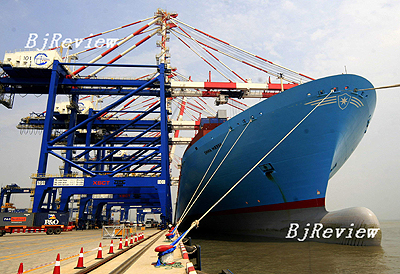
The Chinese Government made its boldest move ever to slash tax rebates (tax breaks on revenues derived from exports) affecting thousands of exporting items and companies.
The targeted 2,831 items account for 37 percent of all exported products, according to the Ministry of Finance. The new tax rebate system has five levels: 17 percent, 13 percent, 11 percent, 9 percent and 5 percent, down 2 percentage points on average from the previous rate.
China has toughened its stance towards exports that harm the environment and consume large amounts of energy and resources. Tax rebates for 553 exported commodities falling into these categories were totally abolished starting from July 1. The affected products include mineral products like salt and cement, chemical products like fertilizer and dyes, as well as leather, some wood boards and disposable wood products, and non-ferrous mineral processing products.
Also from July 1, tax rebates on exports of 2,268 commodities that “tend to cause trade friction” were reduced. This category includes clothing, shoes and headwear, toys, paper products, vegetable oil, plastics, rubber and finished products, some stone material, chinaware and finished products, as well as some iron and steel products.
The ministry said the move was part of a basket of measures to suppress overheated export growth and ease friction between China and its trading partners. Since 2004, China has readjusted its tax rebate policy many times and quickened its attempts at bringing its soaring trade surplus under control.
A needed adjustment
Professor Xu Fu with the International Economics Department of Nankai University said China aims to optimize its industrial structure through these measures. “The targeted items of this round of rebate adjustment are those which will be restricted to produce and forbidden from being exported,” Xu said.
So far this year, production, export and investment of some major energy consumption industries and some heavy polluting industries have been growing fast. According to official statistics, from January to April, the growth rate in the production of chemical products, building materials, iron and steel, and non-ferrous metal industries were 3.4, 5.2, 9.2 and 3.9 percentage points higher respectively than the average industry growth rate. The output of energy intensive products was growing faster, boosting their exports.
Xie Zhenhua, Vice Chairman of the National Development and Reform Commission, said the rapid expansion of these industries would lead to increased consumption of energy and resources, which would add pressure to the government’s responsibility of reducing energy consumption. Xie said China must adjust its economic structure and change its previous growth track.
The China Iron and Steel Association pointed out that due to the constant reduction of tax rebates of relevant iron and steel products, some domestic iron and steel companies are reforming their old-fashioned mentality and switching over to high value-added products. The association also said that the integration of China’s iron and steel industry keeps strengthening, and companies are more inclined to form partnerships to boost competitiveness.
Exporting companies suffer
Customs statistics show that the trade surplus from January to May swelled 83 percent to $86 billion compared with the same period last year. Therefore, the world might be happy observing China’s latest moves to cut tax rebates. However, Chinese companies heavily dependent on tax rebates are suffering the most.
“A 30-million-yuan contract might be gone with wind,” sighed Zhang Peng, chairman of a steel tube manufacturing company.
Zhang had a bitter story to tell. He was thrilled in January, but could be devastated in July.
Zhang’s company signed a contract of providing 50,000 tons of steel tube for a Singaporean company in January, and the contract only began to be fulfilled in June. “We were supposed to finish shipping by August, but since the tax rebate has been totally eliminated, a small company like ours will go bankrupt if we sell the steel tube at the original offer,” Zhang said.
The tax rebate for steel tube was cut to zero percent. The original level was 13 percent. A rebate reduction of 13 percentage points roughly means a 13 percent decrease in profits for Zhang’s company.
Zhang was not satisfied with the tax rebate reduction and complained that the frequent and sudden changes in rebate policies made it hard to make decisions.
“It came all of a sudden,” Zhang exclaimed.
Many exporting companies said they’ve had to raise their prices to cope with the rebate reduction, thus shifting the responsibility to buyers. Zhang did the same. “I talked with my Singaporean customers for a whole afternoon, and we could only sell at 13 percent higher than the original offer,” Zhang said. He believes the domestic iron and steel price will be slashed and the whole industry will be hit hard.
According to the Ministry of Finance, one of the major targets of this round of tax rebate reduction was to optimize industry structure. But Zhang didn’t think in the same way. “We understand the government’s goodwill,” said Zhang, “But the tax rebate reduction doesn’t help improve production significantly, and the government didn’t show us how to advance ourselves.”
| 